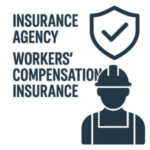
Nursing Home Workers’ Compensation Insurance: The Ultimate Administrator Handbook
September 7, 2025
Cheap Workers’ Comp Insurance: Staffing Firm Guide
September 8, 2025In today’s competitive labor market, recruitment agencies play a pivotal role in connecting businesses wiht qualified talent across various industries. However, with the unique nature of their workforce-often comprising temporary, contract, and contingent workers-these agencies face distinct challenges in managing employee safety and regulatory compliance. One critical aspect that recruitment agencies must carefully consider is workers’ compensation insurance. Understanding the coverage options available for workers’ compensation not only ensures legal compliance but also protects both the agency and its placed workers against the financial risks associated with workplace injuries.This article explores the key coverage options tailored specifically for recruitment agencies, providing insights to help industry professionals make informed decisions that align with their operational needs and risk management strategies.
Table of Contents
- Coverage Benefits Tailored to GA Recruitment Agencies
- Assessing Risk Factors Unique to Temporary and Contract workers
- Choosing the Right Workers’ Comp Policy for Diverse Workforce Needs
- Best Practices for Managing Claims and Reducing Premium Costs
- Q&A
- Closing Remarks
Coverage Benefits Tailored to GA recruitment Agencies
Understanding the unique risks faced by GA recruitment agencies is essential when selecting workers’ compensation coverage. Tailored benefits ensure your workforce is protected from on-the-job injuries while maintaining competitive premiums. Key features often include:
- Customized Injury Rehabilitation Programs: Supportive care designed to get employees back to work quickly and safely.
- Thorough Medical Expense Coverage: Includes doctor visits, hospital stays, and necessary treatments related to workplace injuries.
- Temporary and Permanent Disability Benefits: financial assistance for employees unable to work due to injury.
- Claims Management Support: Streamlined processes to reduce administrative burdens and expedite claim resolution.
Below is a simplified overview of coverage options and how they align with agency needs, helping to identify the most beneficial choices:
| Coverage Aspect | Benefit Highlights | Ideal For |
|---|---|---|
| Medical Payments | Full coverage for injury treatment costs | All recruitment staff, including site visits |
| Disability Coverage | Wage replacement during recovery period | Employees with direct client engagement |
| Return-to-Work Programs | Gradual reintegration support and modified duties | Long-term staff retention focus |
| Legal Defence | Protection against injury-related lawsuits | High-exposure operational environments |
Assessing Risk Factors Unique to Temporary and Contract Workers
Temporary and contract workers frequently enough face a distinct set of risks compared to permanent employees due to the transient nature of their assignments and varied work environments. These workers may undergo limited training, encounter inconsistent safety protocols, and adapt quickly to unfamiliar job sites. This variability inherently increases exposure to workplace hazards such as improper equipment use, insufficient hazard communication, and lack of continuous supervision. Employers and insurers must factor these nuances into workers’ compensation coverage to ensure adequate protection and compliance with regulatory standards.
Key risk factors to consider include:
- Jobsite variability: Frequent changes in work locations can lead to unfamiliar and unpredictable hazards.
- Training gaps: Temporary staff might receive less comprehensive safety training than full-time employees.
- integration challenges: Limited time on-site can reduce opportunities to assess and mitigate workplace risks effectively.
To illustrate coverage prioritization based on risk severity, the table below outlines common temporary worker risk factors alongside appropriate coverage focus areas:
| Risk Factor | Impact on Coverage | Recommended Coverage Focus |
|---|---|---|
| Jobsite variability | Higher unpredictability of claims | Flexible and comprehensive injury protection |
| Training gaps | Increased likelihood of user error injuries | Inclusion of occupational health support and retraining coverage |
| Integration challenges | Delayed hazard identification | Enhanced medical and claims management services |
Choosing the Right Workers’ Comp Policy for diverse Workforce Needs
recruitment agencies in Georgia face unique challenges when selecting workers’ compensation policies due to the varied roles and industries their placed employees engage in. It is essential to assess the risk profiles associated with each job classification to tailor coverage effectively. A comprehensive policy should allow for flexible payroll classifications, accommodate seasonal workforce fluctuations, and provide options for partial or full coverage depending on contract terms with clients. Clarity in claims handling and the availability of dedicated risk management services can further enhance protection for diverse employee groups.
Consider these critical features when evaluating policy options:
- Multi-state coverage for clients operating beyond Georgia
- Customized premium rates based on job-specific risk factors
- Return-to-work programs to reduce claim costs and downtime
- Claims support infrastructure with digital access and fast response teams
- Experience modification factor adjustments to reward safer work environments
| Policy Feature | Benefit | Applicability |
|---|---|---|
| Flexible Class Codes | Accurate risk pricing | All job roles |
| Payroll Segmentation | Cost optimization | Seasonal and temporary staff |
| Digital Claims Portal | Faster claim resolution | High-volume placements |
Best practices for Managing Claims and reducing Premium Costs
Effective management of workers’ compensation claims is essential not only to ensure timely support for injured employees but also to control insurance premiums for recruitment agencies in Georgia. Implementing a robust claims process involves prompt reporting and thorough documentation of incidents, which helps in verifying the legitimacy of claims and facilitates faster resolution. Encouraging open communication between the workers, supervisors, and claims adjusters can prevent misunderstandings and reduce claim costs.Additionally,regular training on workplace safety and injury prevention tailored specifically for agency workers reduces the frequency and severity of claims,which directly contributes to premium stabilization.
Agencies can also leverage strategic partnerships with insurers to tailor coverage and identify risk management programs that reward safe practices. The table below outlines essential strategies alongside their benefits, allowing recruitment agencies to prioritize initiatives that provide the highest impact on cost savings.
| Strategy | Benefit |
|---|---|
| Immediate Incident Reporting | Faster claim processing & fraud reduction |
| Regular Safety Training | Lower injury rates and improved compliance |
| Open Communication Channels | Better claim transparency & employee trust |
| Customized Insurance Programs | Optimal coverage with premium discounts |
Q&A
Q&A: Coverage Options for GA Recruitment Agency Workers’ comp
Q1: What is workers’ compensation insurance for GA recruitment agencies?
A1: Workers’ compensation insurance provides coverage for employees of Georgia-based recruitment agencies who suffer work-related injuries or illnesses. It covers medical expenses,lost wages,rehabilitation costs,and legal fees related to workplace injuries,ensuring both employees and employers are protected.
Q2: Who is required to have workers’ comp coverage in Georgia recruitment agencies?
A2: In Georgia, most employers with three or more employees must carry workers’ compensation insurance. Recruitment agencies that employ temporary or contract workers directly are generally required to provide coverage. Though, if workers are truly autonomous contractors, coverage requirements may vary.
Q3: What types of workers’ comp coverage options are available for recruitment agencies in Georgia?
A3: Recruitment agencies in Georgia can choose from several coverage options including:
- Primary Coverage: Covers injuries sustained by direct employees of the agency.
- Voluntary Coverage: Provides benefits for non-mandatory situations, such as injuries to independent contractors or volunteers.
- Excess Coverage: Offers additional protection beyond the primary policy limits for high-cost claims.
- Monopolistic State Fund: Georgia is a competitive state, meaning agencies can purchase coverage from private insurers or the state fund.
Q4: How do recruitment agencies determine the cost of workers’ comp insurance?
A4: Premiums are calculated based on factors such as payroll size, the classification of workers (reflecting the risk associated with their roles), claim history, agency size, and overall safety practices. Recruitment agencies with employees placed in higher-risk industries may face higher premiums.
Q5: Can recruitment agencies get customized workers’ comp policies?
A5: Yes. Many insurers offer tailored workers’ compensation policies specifically designed for recruitment agencies, considering the unique risks involved, such as employees working onsite at client locations or varying job roles in temporary placements.
Q6: Are there alternatives for recruitment agencies that want to self-insure?
A6: Larger recruitment agencies in Georgia may apply to become self-insured, but this requires meeting strict financial and regulatory requirements set by the state. self-insurance can offer cost savings but involves higher risk and administrative responsibility.
Q7: How does workers’ comp coverage benefit the recruitment agency financially?
A7: Workers’ compensation insurance helps mitigate financial risks by covering costly medical and legal expenses arising from workplace injuries. It protects the agency from potential lawsuits and ensures compliance with Georgia law, avoiding fines and penalties.Q8: What should recruitment agencies look for when selecting a workers’ comp provider?
A8: Agencies should evaluate providers based on financial stability, experience with the staffing industry, claims handling efficiency, availability of safety programs, and flexibility in coverage options to ensure they receive comprehensive and cost-effective protection.
Q9: How can recruitment agencies reduce their workers’ comp premiums?
A9: Agencies can reduce premiums by implementing robust workplace safety programs, conducting regular employee training, properly classifying employees, maintaining accurate payroll records, and working with insurers to penalize high-risk practices.
Q10: Where can GA recruitment agencies get help with workers’ comp coverage?
A10: Agencies can consult with specialized insurance brokers, the georgia State Board of Workers’ Compensation, or industry associations for guidance on coverage requirements, policy options, and best practices for risk management.
Closing Remarks
selecting the right workers’ compensation coverage is essential for GA recruitment agencies seeking to protect their workforce and comply with state regulations. By carefully evaluating the available options-from traditional policies to customized plans tailored specifically for recruitment firms-agencies can ensure comprehensive protection against workplace injuries and associated liabilities. Partnering with learned insurance providers who understand the unique risks in the recruitment sector will further enhance risk management efforts and support long-term operational stability. Ultimately, a well-structured workers’ comp strategy is a vital investment in both employee well-being and business resilience.
“This content was generated with the assistance of artificial intelligence. While we strive for accuracy, AI-generated content may not always reflect the most current information or professional advice. Users are encouraged to independently verify critical information and, where appropriate, consult with qualified professionals, lawyers, state statutes and regulations & NCCI rules & manuals before making decisions based on this content.








